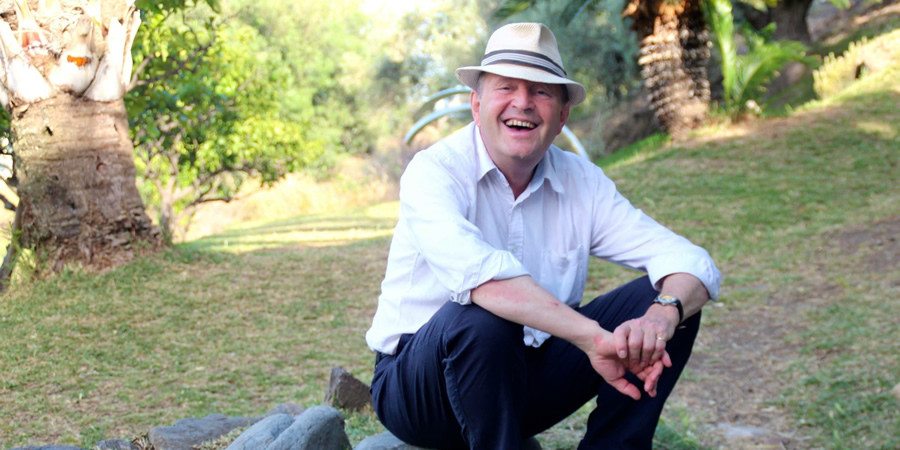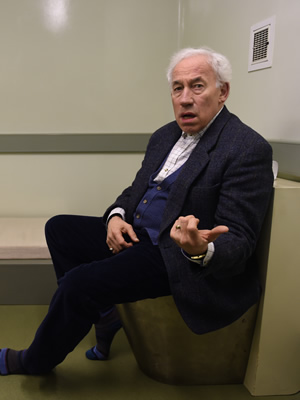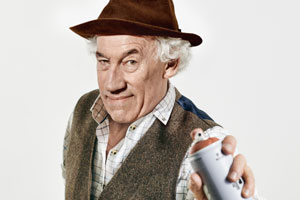Andrew Birch interview

Andrew Birch is the creator behind The Rebel. He says that, in the end, Henry Palmer, is essentially him.
What inspired you to transfer your very successful cartoon strip from The Oldie magazine to TV?
After several years of trying unsuccessfully to write sitcoms, the answer was staring me in the face: my Oldie strip. The structure of a cartoon strip and a sitcom are not that different. A strip usually has three frames: setup, development and punchline. A sitcom also has three stages: setup, confusion and resolution. It wasn't that difficult to translate to the screen.
Where did the brilliant comedy character of Henry come from?
Initially he came from my father, who looked and dressed like Henry. He had led a sedate life and was rather controlled by his mother and then his wife. He only broke free after divorcing my mother. Then he sadly developed dementia and lost all restraint. He went round drinking and swearing, just like The Rebel. So he was my original inspiration, but there are bits of me in there, too!
I like to think there are similarities between me and Henry. For instance, I've got a yellow waistcoat like him! But seriously, I suppose Henry is saying what I think but haven't got the nerve to say out loud. I say it through Henry. Obviously, in the end he's essentially me!
Why does the character of Henry chime with people?
Hopefully his rants strike a chord because he articulates what most people can't say or do. He does what we all wish we could do, and says what we all wish we could say. Instead of thinking about hitting a policeman, he actually does so! When you get older, you lose your fear and you don't give a fig because you've got nothing to lose. Although I must add that Henry does also suffer the consequences of his actions. He doesn't get off scot free.
People identify with Henry because the things that anger him are those that anger most of us, especially if you're left-wing. This government is a gift to someone like Henry. He's a conservative dresser, but underneath that he is a real rebel.

Why is Simon Callow such good casting as Henry?
He's such a brilliant comic actor. I was delighted when he took the part. I saw him years ago in The Beastly Beatitudes Of Balthazar B and, of course, in Four Weddings And A Funeral. Plus he looks right. Simon is now Henry, it's as simple as that.
Why did you decide to set The Rebel in Brighton?
Because I live there and could go and watch the filming! Also Brighton is such an interesting place, a real melting pot. You get people left over from other eras, like Mods, Hippies, Punks and even a few ancient Teddy Boys. It's a good place for people to end up in. In that sense, Henry is a typical Brightonian.
Tell us more about the city's diversity...
Brighton is the perfect setting for The Rebel because you find many different sorts of people interacting there. You get the kiss-me-quick hats and fish and chips holiday-makers mingling with the arty-farty Brighton Fringe types. Laurence Olivier lived there. Plus it's the gay capital of Britain. That interaction is marvellous.
Did you rebel as a youngster?
Not particularly - perhaps I rebelled by having long hair like a hippie whilst dressing like a skinhead, so I looked a bit like Dave Hill from Slade! I also rebelled because I didn't do anything with my science degree. After graduating, I lived in a gamekeeper's cottage in the Derbyshire countryside. I signed on and worked in pubs and tried to be a writer. In the end, I didn't get anywhere with my writing, so I started drawing cartoons instead. I had some success in that field and moved back to London and things developed from there. But in the beginning, yes, I rebelled against my education and what I was expected to do with my life. No big deal.
What annoys you about modern life?
Most of the things I'm intolerant of - like cruelty and selfishness - have always existed. But the one thing about modern life that does infuriate me is people glued to their phones all the time, even when they're with friends. So bloody rude. That and privatisation! Oh yes, and Segways. And coffee shops with bare brick walls. And middle class people with dreadlocks. And prats in wetsuits showing off on those horrible jet skis. And...
What's next for you?
Most of my work is still cartooning, but I'm branching out more and more into writing, doing what I wanted to do initially, after all this time. I'm currently thinking about more sitcoms. The Rebel has given me new opportunities. So what's next? Who knows? Perhaps Hollywood beckons!

